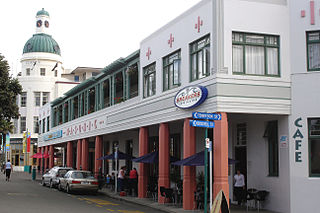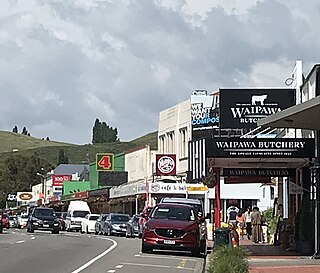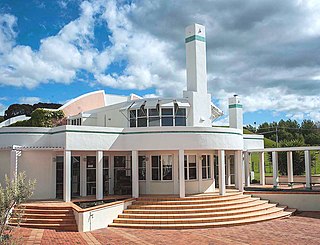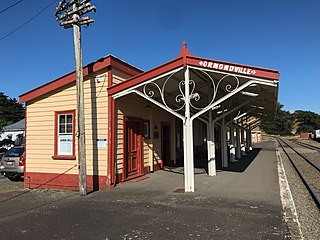
Napier is a city on the eastern coast of the North Island of New Zealand and the seat of the Hawke's Bay region. It is a beachside city with a seaport, known for its sunny climate, esplanade lined with Norfolk pines, and extensive Art Deco architecture. Napier is sometimes referred to as the "Nice of the Pacific", although that is largely outdated and a more common nickname is 'The Art Deco Capital of the world'.
Waipukurau is the largest town in the Central Hawke's Bay District on the east coast of the North Island of New Zealand. It is located on the banks of the Tukituki River, 7 kilometres south of Waipawa and 50 kilometres southwest of Hastings.

Takapau is a small rural community in the Central Hawkes Bay in New Zealand. It is located 20 kilometres west of Waipukurau, off State Highway 2, and has a population of more than 500.

Waipawa is the second-largest town in Central Hawke's Bay in the east of the North Island of New Zealand. It has a population of 2,400.

William Manhire is a New Zealand poet, short story writer, emeritus professor, and New Zealand's inaugural Poet Laureate (1997–1998). He founded New Zealand's first creative writing course at Victoria University of Wellington in 1975, founded the International Institute of Modern Letters in 2001, and has been a strong promoter of New Zealand literature and poetry throughout his career. Many of New Zealand's leading writers graduated from his courses at Victoria. He has received many notable awards including a Prime Minister's Award for Literary Achievement in 2007 and an Arts Foundation Icon Award in 2018.

Jennifer Mary Bornholdt is a New Zealand poet and anthologist. She was New Zealand's Poet Laureate in 2005-2007.
Ōtāne is a town in the Central Hawke's Bay District and the Hawke's Bay region, on the east coast of New Zealand's North Island. The small village, has a school, general store, cafe and pub, and is located just off State Highway 2.

John Kenneth Buck is chairman of Te Mata Estate winery and is widely recognised for his contributions to fine wine and the New Zealand wine industry.

The International Institute of Modern Letters is a centre of creative writing based within Victoria University of Wellington. Founded in 2001, the IIML offers undergraduate and postgraduate courses and has taught many leading New Zealand writers. It publishes the annual Ōrongohau | Best New Zealand Poems anthology and an online journal, and offers several writing residencies. Until 2013 the IIML was led by the poet Bill Manhire, who had headed Victoria's creative writing programme since 1975; since his retirement, Damien Wilkins has taken over as the IIML's director.
Te Mata is the name of several places in New Zealand. It is also Spanish for “it kills you”.

Te Mata Estate is an independent, family-owned Hawke's Bay winery and New Zealand's oldest, in continuous operation since 1895. The winery produces everything on-premises at their Havelock Hills site near Havelock North, 15 kilometres (9.3 mi) south of Napier. Established in the late 19th century by the Chambers family, the winery and original vineyards were the first to be heritage-protected, and is one of New Zealand's most highly regarded wineries.
Chris Tse is a New Zealand poet, short story writer and editor. His works explore questions of identity, including his Chinese heritage and queer identity. His first full-length poetry collection, How to be Dead in a Year of Snakes, won the Jessie Mackay Award for Best First Book of Poetry at the Ockham New Zealand Book Awards in 2016. In 2022, he was appointed as the New Zealand Poet Laureate from 2022 to 2024. In February 2024, his term was extended by another year.

The Hawke's Bay wine region is New Zealand's oldest and second-largest wine-production region, on the east coast of the North Island. Production reached 41,000 tonnes in 2018 from 4,681 hectares of planted vines, representing 10.2% of total national production. Some of the oldest wineries still operating in New Zealand, including Te Mata Estate, Church Road, and Mission Estate, were established in the Hawke's Bay area in the late 19th century. Despite this, it was only established as a geographical indication (GI) in 2018. The GI protects any wine produced within the boundaries of the entire Hawke's Bay Region, but in practice the vineyards are chiefly concentrated in the plains and low hills surrounding the cities of Napier and Hastings.

Ormondville is a locality in the Manawatū-Whanganui region of New Zealand's North Island. It is located inland, south of Waipukurau and west of Flemington, Hawke's Bay.

Opaparailway station is a preserved station on the Palmerston North–Gisborne Line in New Zealand's North Island that closed in 1981. It is in the Hastings District of Hawke's Bay, 23.56 km (14.64 mi) south of Hastings city, in a census meshblock with a population of only 222 in 2018.

Matamau is a small village, on a ridge between the Matamau and Whakaruatapu Streams, tributaries of the Manawatū River, in the Manawatū-Whanganui region of New Zealand's North Island. State Highway 2 and the Palmerston North–Gisborne line run through the village. It has a rare surviving example of a basic railway station, a cafe, developed from the former post office and store about 1969, and a truck repair workshop. Until the 1870s it was densely forested, but most of the trees were felled and milled by 1910 and replaced by farms.
Hatuma is 7 km (4.3 mi) south of Waipukurau, in Central Hawke's Bay in the east of the North Island of New Zealand. Meshblock 7016748, which covers 19.3 km2 (7.5 sq mi) from the edge of Waipukurau to Marakeke, had a population of 153 in 2018.

Piripiri is a sparsely populated area in the Tararua District, in the Manawatū-Whanganui Region, on State Highway 2 and the Palmerston North–Gisborne line. It is 3 mi 8 ch (5.0 km) north of Dannevirke, and has 150 people scattered over a meshblock of 21.8 km2 (8.4 sq mi).

Rissington is a farming settlement 15 km (9.3 mi) north west of Napier, New Zealand. It lies in Hawke's Bay Region, between Sherenden and Napier, in the Mangaone River valley, on the road to Patoka and Puketitiri. A fire station, cemetery and a war memorial are the only remaining public structures, but it once had several more and was home to the country's first Women's Institute, co-founded by Amy Hutchinson and Bessie Spencer.
Verb Wellington is an organisation that since 2014 has run an annual literary festival in Wellington, New Zealand called Verb Writers and Readers Festival. It was founded by Claire Mabey. Part of the festival is an event called LitCrawl which is like a pub crawl, across many venues. In addition to the festival, Verb Wellington run other events; for example, it partnered with the British Council in 2023 to bring together Chris Tse and Simon Armitage at an event called Does Literature Matter? at the National Library of New Zealand.














